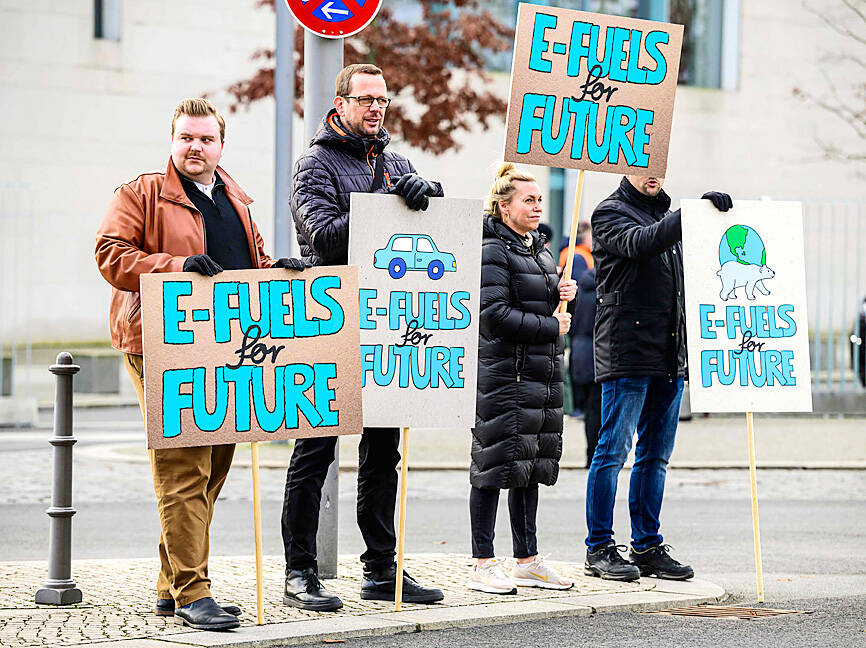The European Commission is to propose a legal route to exempt vehicles that run on electrofuels (e-fuels) from the EU’s 2035 phaseout of new combustion engine vehicles, a document detailing a deal struck with Germany showed.
The deal, reached late on Friday, resolves a row that has for weeks delayed the bloc’s main carbon-cutting policy for vehicles.
Germany’s transportation ministry had objected to the EU’s planned law banning sales of new carbon-emitting vehicles in 2035, demanding an exemption for combustion engine vehicles that run on e-fuels.

Photo: AFP
A commission document seen by Reuters yesterday showed how the EU plans to grant that exemption.
As soon as EU countries approve the 2035 phaseout law, the commission is to present a regulation allowing automakers to register a new type of vehicle that can only run on carbon-neutral fuels.
The commission is then to present another regulation specifying how these vehicles can contribute to the 2035 target, the document said.
That would be done through a delegated act — a type of law that is difficult for EU countries and lawmakers to reject, as doing so requires backing from a majority of either.
As an extra reassurance to Germany, the commission said that if this law is rejected, it would “follow another legislative path” to allow e-fuel vehicle sales.
E-fuels are made using captured carbon emissions and low-carbon hydrogen.
Such fuels are not yet produced at scale, but are seen by some automakers as a route to prolonging the use of combustion engines.
Germany’s demand was supported by parts of the country’s powerful auto industry.
The exemption was criticized by climate campaigners.
“E-fuels are an expensive and massively inefficient diversion from the transformation to electric facing Europe’s carmakers,” said Julia Poliscanova, a senior director of vehicles and e-mobility at campaign group Transport & Environment.
Berlin’s late opposition came despite EU countries and the European Parliament agreeing to a deal on the combustion engine phaseout law last year.
The move has irked some EU diplomats, who say it could embolden governments to block other carefully negotiated deals on climate policies.
EU countries’ ambassadors were yesterday to vote on the 2035 combustion engine phaseout law, and discuss the EU-German deal.
If diplomats approve it, EU energy ministers could give final approval to the 2035 law at a meeting in Brussels today, allowing it to enter into force.

To many, Tatu City on the outskirts of Nairobi looks like a success. The first city entirely built by a private company to be operational in east Africa, with about 25,000 people living and working there, it accounts for about two-thirds of all foreign investment in Kenya. Its low-tax status has attracted more than 100 businesses including Heineken, coffee brand Dormans, and the biggest call-center and cold-chain transport firms in the region. However, to some local politicians, Tatu City has looked more like a target for extortion. A parade of governors have demanded land worth millions of dollars in exchange

Hong Kong authorities ramped up sales of the local dollar as the greenback’s slide threatened the foreign-exchange peg. The Hong Kong Monetary Authority (HKMA) sold a record HK$60.5 billion (US$7.8 billion) of the city’s currency, according to an alert sent on its Bloomberg page yesterday in Asia, after it tested the upper end of its trading band. That added to the HK$56.1 billion of sales versus the greenback since Friday. The rapid intervention signals efforts from the city’s authorities to limit the local currency’s moves within its HK$7.75 to HK$7.85 per US dollar trading band. Heavy sales of the local dollar by

Taiwan Semiconductor Manufacturing Co’s (TSMC, 台積電) revenue jumped 48 percent last month, underscoring how electronics firms scrambled to acquire essential components before global tariffs took effect. The main chipmaker for Apple Inc and Nvidia Corp reported monthly sales of NT$349.6 billion (US$11.6 billion). That compares with the average analysts’ estimate for a 38 percent rise in second-quarter revenue. US President Donald Trump’s trade war is prompting economists to retool GDP forecasts worldwide, casting doubt over the outlook for everything from iPhone demand to computing and datacenter construction. However, TSMC — a barometer for global tech spending given its central role in the

An Indonesian animated movie is smashing regional box office records and could be set for wider success as it prepares to open beyond the Southeast Asian archipelago’s silver screens. Jumbo — a film based on the adventures of main character, Don, a large orphaned Indonesian boy facing bullying at school — last month became the highest-grossing Southeast Asian animated film, raking in more than US$8 million. Released at the end of March to coincide with the Eid holidays after the Islamic fasting month of Ramadan, the movie has hit 8 million ticket sales, the third-highest in Indonesian cinema history, Film